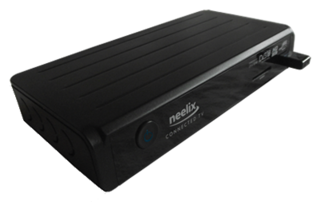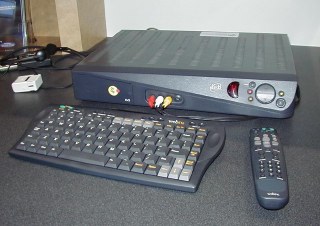
A set-top box (STB), also colloquially known as a cable box and historically television decoder, is an information appliance device that generally contains a TV-tuner input and displays output to a television set and an external source of signal, turning the source signal into content in a form that can then be displayed on the television screen or other display device. They are used in cable television, satellite television, and over-the-air television systems as well as other uses.

TiVo is a digital video recorder (DVR) developed and marketed by Xperi and introduced in 1999. TiVo provides an on-screen guide of scheduled broadcast programming television programs, whose features include "OnePass" schedules which record every new episode of a series, and "WishList" searches which allow the user to find and record shows that match their interests by title, actor, director, category, or keyword. TiVo also provides a range of features when the TiVo DVR is connected to a home network, including film and TV show downloads, advanced search, personal photo viewing, music offerings, and online scheduling.

Video on demand (VOD) is a media distribution system that allows users to access videos without a traditional video playback device and the constraints of a typical static broadcasting schedule. In the 20th century, broadcasting in the form of over-the-air programming was the most common form of media distribution. As Internet and IPTV technologies continued to develop in the 1990s, consumers began to gravitate towards non-traditional modes of content consumption, which culminated in the arrival of VOD on televisions and personal computers.

NTL Incorporated, branded as ntl:, was a United States-listed British company founded in 1992, which provided cable television, cable internet and fixed-line cable telephone services. While NTL had its headquarters in New York City, the company's activities focused heavily on the United Kingdom, with operational headquarters in Hook, Hampshire.

MSN TV was a web access product consisting of a thin client device which used a television for display, and the online service that supported it. The device design and service was developed by WebTV Networks, Inc., a company started in 1995. The WebTV product was announced in July 1996 and later released on September 18, 1996. In April 1997, the company was purchased by Microsoft Corporation and in July 2001, was rebranded to MSN TV and absorbed into MSN.

Top Up TV was a pay TV service in the United Kingdom which launched in March 2004, operating on the digital terrestrial television platform. The aim of the service was to "top up" Freeview customers by providing additional content and services through encrypted TV channels unavailable to other viewers.
Streaming television is the digital distribution of television content, such as TV shows, as streaming media delivered over the Internet. Streaming TV stands in contrast to dedicated terrestrial television delivered by over-the-air aerial systems, cable television, and/or satellite television systems.

Internet Protocol television (IPTV) is the delivery of television content over Internet Protocol (IP) networks. This is in contrast to delivery through traditional terrestrial, satellite, and cable television formats. Unlike downloaded media, IPTV offers the ability to stream the source media continuously. As a result, a client media player can begin playing the content almost immediately. This is known as streaming media.

Austar was an Australian telecommunications company. Its main business activity was subscription television but it has also been involved with internet access and mobile phones. It was founded in 1995 under the name Community Entertainment Television (CETV).
ESPN3 is an online streaming service owned by ESPN Inc., a joint venture between The Walt Disney Company and Hearst Communications, that provides live streams and replays of global sports events to sports fans in the United States.
Zattoo is a TV platform for IP-based transmission of television channels and video on demand content to a variety of devices. The company headquarters are located in Zurich and it has an additional office in Berlin. Zattoo is operational in two business areas - in addition to its own B2C TV streaming operations aimed at end customers in countries such as Germany and Switzerland, Zattoo has a B2B offering and works with telecommunication companies worldwide.

Virgin TV is a digital pay cable television service in the United Kingdom, owned by Liberty Global (50%) and Telefónica (50%) after the merger its UK businesses to form Virgin Media O2. Its origins date from NTL and Telewest, formerly two of the UK's largest cable operators, which merged on 6 March 2006. All NTL:Telewest services were rebranded as Virgin Media in February 2007. Since the acquisition of Smallworld Cable in 2014, Virgin is the sole national cable TV provider in Great Britain. Currently about 51% of UK households have access to Virgin's network, which is independent from BT's Openreach network.

Sling Media Inc. is a technology company that develops placeshifting and Smart TV solutions for consumers, multiple-system operators and set top box manufacturers. The company is based in Foster City, California, and was a subsidiary of EchoStar Corporation. Their initial product, the Slingbox, debuted on the US market on July 1, 2005. The EchoStar business unit was part of a corporate assets exchange with Dish Network at the beginning of 2017 and now operates as Dish Technologies Corporation under Dish Network.

On Demand was the brand name of a range of video on demand services from Sky UK designed to compete with rival companies such as Virgin TV or BT TV as well as internet television services such as Amazon Prime Video and Netflix.
MobiTV, Inc. is a provider of live and on-demand video delivery solutions, headquartered in Emeryville, California. MobiTV is a privately held, venture-backed company, and was founded in 1999 by Paul Scanlan, Phillip Alvelda, and Jeff Annison. Charlie Nooney joined the company as CEO and Chairman on October 15, 2007.
Internet television in Australia is the digital distribution of movies and television content via the Internet. In Australia, internet television is provided by a number of generalist, subscription-based streaming service providers, in addition to several niche providers that focus on specific genres. Australia's five major free-to-air television networks also all offer catch up TV of previously broadcast content to watch via their webpages and apps, and a number of ISPs and other companies offer IPTV – the live streaming of television channels sourced from Australia and elsewhere.
An over-the-top (OTT) media service is a media service offered directly to viewers via the Internet. OTT bypasses cable, broadcast, and satellite television platforms, the types of companies that traditionally act as controllers or distributors of such content. It has also been used to describe no-carrier cellphones, where all communications are charged as data, avoiding monopolistic competition, or apps for phones that transmit data in this manner, including both those that replace other call methods and those that update software.
An online video platform (OVP), provided by a video hosting service, enables users to upload, convert, store and play back video content on the Internet, often via a structured, large-scale system that may generate revenue. Users generally will upload video content via the hosting service's website, mobile or desktop application, or other interface (API). The type of video content uploaded might be anything from shorts to full-length TV shows and movies. The video host stores the video on its server and offers users the ability to enable different types of embed codes or links that allow others to view the video content. The website, mainly used as the video hosting website, is usually called the video sharing website.

Tubi is an American over-the-top content platform and ad-supported streaming service owned by Fox Corporation. The service was launched on April 1, 2014, and is based in San Francisco, California. In January 2021, Tubi reached 33 million monthly active users. As of January 2022, Tubi has 51 million monthly active users.
Pluto TV is an internet television service owned and operated by Paramount Streaming, a division of Paramount Global. Co-founded by Tom Ryan, Ilya Pozin and Nick Grouf in 2013 and based in Los Angeles, California, in the United States, and parts of the rest of the Americas, and Europe. Pluto is an advertiser-supported video-on-demand (AVOD) service that primarily offers a selection of programming content through digital linear channels designed to emulate the experience of traditional broadcast programming. The service's revenue is generated from video advertisements seen during programming within ad breaks structured similarly to those found on conventional television.











